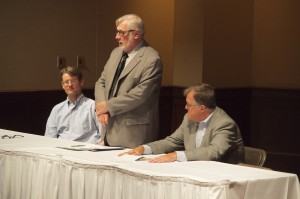By Jordan Finger
Correspondent

The College celebrated Constitution Day with a politics forum on Thursday, Sept. 19, featuring professors from distinct disciplines who discussed the NSA and CIA surveillance leaks and what it means for national security.
“The NSA/CIA Surveillance Leaks and their Constitutional Implications” panel directed its discussion specifically to how surveillance is linked to and founded on principles in the U.S. Constitution.
Political science professor Daryl Fair overviewed the legal and constitutional issues surrounding NSA surveillance. Fair discussed two significant pieces of legislation: First, was the collection of telephone metadata under the United States Patriot Act, and the second was PRISM under the Foreign Intelligence Surveillance Act.
“The government suggests all information acquired by telephone companies is company property and can be delivered to authorities,” Fair said. “Repeat this one million times and you have the telephone metadata program.”
He then shifted his focus to PRISM, a program that collects data on the Internet from individuals and organizations, implying a conditional waiver of Fourth Amendment rights for investigated parties.
“Living under surveillance begins a balancing act between our civil liberties and the interest of government to protect us from threats,” criminology professor Bruce Stout said. “In some respects we want our government to be intrusive. The question is: How far are we willing to allow our government to go?”
The issues of primary interest to Stout were those concerning the federal government system.
“We have inefficient and improper oversight of government action,” Stout said. “There is significant evidence suggesting the system of checks and balances is inoperative.”
While these statements may seem outrageous, Stout pointed out that historians already view the Patriot Act as flawed legislation, even considering the post-9/11 government under which it was developed.
Philosophy professor James Taylor instead looked at security in the broader sense.
“When we assume government surveillance violates privacy, what we’re really saying is the government doesn’t have any just reason to secure the information it is acquiring,” Taylor said.
Taylor compared witness testimony to Internet/telephone surveillance and argued that in essence, the government extracts information the same way in both cases.
“Witness testimony allows government to acquire information about the actions, whereabouts and information viewed by people who are innocent of any crime,” Taylor said. “If we extract this information on the same legal grounds we acquire people to serve as witnesses, it seems there is no moral or political bar to us doing so.”
Taylor concluded by asserting that Americans trust government officials to an unimaginable degree. In other words, why scoff at the Patriot Act if the same private information is available in other instances anyway?






